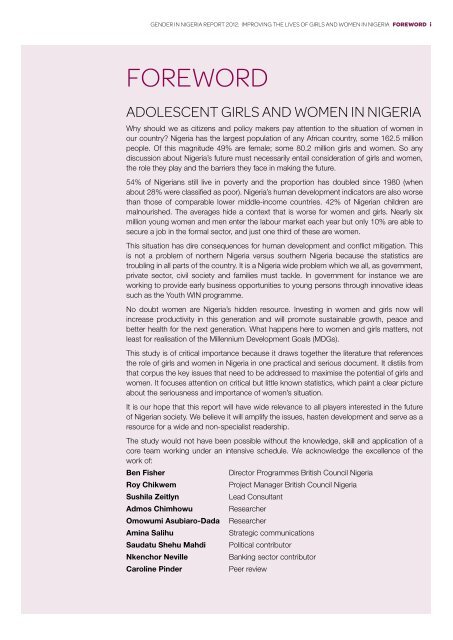Gender in niGeria report 2012 - Economic Commission for Africa
Gender in niGeria report 2012 - Economic Commission for Africa
Gender in niGeria report 2012 - Economic Commission for Africa
Create successful ePaper yourself
Turn your PDF publications into a flip-book with our unique Google optimized e-Paper software.
<strong>Gender</strong> <strong>in</strong> Nigeria Report <strong>2012</strong>: Improv<strong>in</strong>g the Lives of Girls and Women <strong>in</strong> Nigeria FOREWORD i<br />
FOREWORD<br />
Adolescent Girls and Women <strong>in</strong> Nigeria<br />
Why should we as citizens and policy makers pay attention to the situation of women <strong>in</strong><br />
our country? Nigeria has the largest population of any <strong>Africa</strong>n country, some 162.5 million<br />
people. Of this magnitude 49% are female; some 80.2 million girls and women. So any<br />
discussion about Nigeria’s future must necessarily entail consideration of girls and women,<br />
the role they play and the barriers they face <strong>in</strong> mak<strong>in</strong>g the future.<br />
54% of Nigerians still live <strong>in</strong> poverty and the proportion has doubled s<strong>in</strong>ce 1980 (when<br />
about 28% were classified as poor). Nigeria’s human development <strong>in</strong>dicators are also worse<br />
than those of comparable lower middle-<strong>in</strong>come countries. 42% of Nigerian children are<br />
malnourished. The averages hide a context that is worse <strong>for</strong> women and girls. Nearly six<br />
million young women and men enter the labour market each year but only 10% are able to<br />
secure a job <strong>in</strong> the <strong>for</strong>mal sector, and just one third of these are women.<br />
This situation has dire consequences <strong>for</strong> human development and conflict mitigation. This<br />
is not a problem of northern Nigeria versus southern Nigeria because the statistics are<br />
troubl<strong>in</strong>g <strong>in</strong> all parts of the country. It is a Nigeria wide problem which we all, as government,<br />
private sector, civil society and families must tackle. In government <strong>for</strong> <strong>in</strong>stance we are<br />
work<strong>in</strong>g to provide early bus<strong>in</strong>ess opportunities to young persons through <strong>in</strong>novative ideas<br />
such as the Youth WIN programme.<br />
No doubt women are Nigeria’s hidden resource. Invest<strong>in</strong>g <strong>in</strong> women and girls now will<br />
<strong>in</strong>crease productivity <strong>in</strong> this generation and will promote susta<strong>in</strong>able growth, peace and<br />
better health <strong>for</strong> the next generation. What happens here to women and girls matters, not<br />
least <strong>for</strong> realisation of the Millennium Development Goals (MDGs).<br />
This study is of critical importance because it draws together the literature that references<br />
the role of girls and women <strong>in</strong> Nigeria <strong>in</strong> one practical and serious document. It distils from<br />
that corpus the key issues that need to be addressed to maximise the potential of girls and<br />
women. It focuses attention on critical but little known statistics, which pa<strong>in</strong>t a clear picture<br />
about the seriousness and importance of women’s situation.<br />
It is our hope that this <strong>report</strong> will have wide relevance to all players <strong>in</strong>terested <strong>in</strong> the future<br />
of Nigerian society. We believe it will amplify the issues, hasten development and serve as a<br />
resource <strong>for</strong> a wide and non-specialist readership.<br />
The study would not have been possible without the knowledge, skill and application of a<br />
core team work<strong>in</strong>g under an <strong>in</strong>tensive schedule. We acknowledge the excellence of the<br />
work of:<br />
Ben Fisher<br />
Director Programmes British Council Nigeria<br />
Roy Chikwem<br />
Project Manager British Council Nigeria<br />
Sushila Zeitlyn<br />
Lead Consultant<br />
Admos Chimhowu Researcher<br />
Omowumi Asubiaro-Dada Researcher<br />
Am<strong>in</strong>a Salihu<br />
Strategic communications<br />
Saudatu Shehu Mahdi Political contributor<br />
Nkenchor Neville<br />
Bank<strong>in</strong>g sector contributor<br />
Carol<strong>in</strong>e P<strong>in</strong>der<br />
Peer review

















